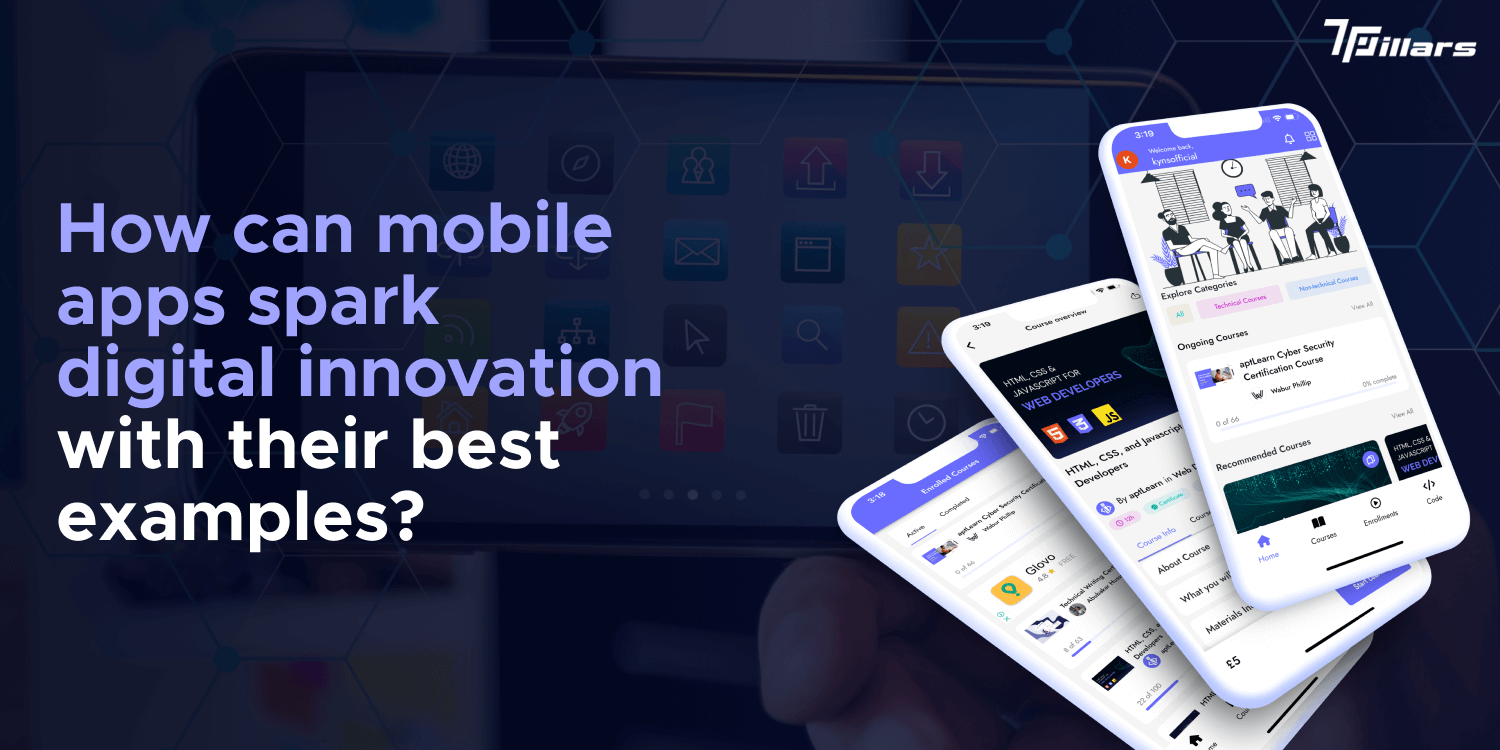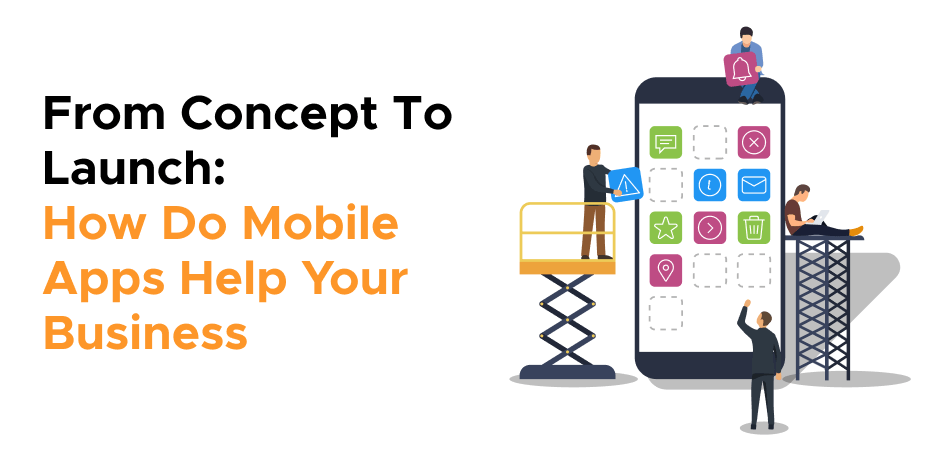Quick Chat
with you!
You have our ear and we can't wait to hear about your idea! Share your details here and we will make sure to schedule a coffee date with you soon.

It is hard to even sometimes associate ‘convenience’ with what mobile apps have done: they have triggered a change in every market in the modern world that moves with the speed of light. As mobile phones have become such an essential part of people’s lives, opportunities for mobile applications to revolutionize organizations, their operations, and relationships with customers and clients have never been more available. Mobile apps, developed by a mobile app development company, have changed users’ experiences to new levels and invented business models that should have been considered before using them.
For instance, retail apps like Amazon or Shopify have made shopping different because they cater to individual needs and preferences. This includes augmented reality fitting rooms to AI-driven recommendations, getting consumers’ attention from the customers, which translates into loyalty and sales. For this reason, these inventions prove how mobile apps can offer customers an immersive experience to keep returning for more.
Mobile applications are revolutionizing how startups and established companies think about business models. For example, the whole on-demand services sector, from Uber to DoorDash, is disrupting entire industries by harnessing technology for immediate solutions to everyday needs. Companies, including mobile app development companies in Australia, are therefore constantly innovating, which propels them to adopt agile methodologies that welcome rapid development and iterative improvement. Thus, businesses are not responding to consumer demands but are instead predicting them; hence, a more dynamic marketplace has emerged.
Although there are several consumer-facing mobile apps, the promise of mobile technology is far beyond those apps. With mobile apps, healthcare sectors transform patient care by including telemedicine and integrating wearable technology in personal health monitoring. Mobile technology will lead to efficient and effective healthcare delivery for better patient care and increased access. The top mobile app development companies in Australia guide healthcare providers to maximize their mobile technology potential which delivers better patient results.
This has further allowed the combination of mobile apps with recent advancements like artificial intelligence, machine learning, and the Internet of Things (IoT), causing new avenues to open and be innovated. This large quantity of information helps the mobile app development company make choices based on well-reasoned decisions to grow each business house. Hyperconnectivity is building the basis of more innovative solutions adapted according to users’ requirements in real-time.
Mobile apps are no longer just convenient tools but powerful engines driving the innovation of the digital era. They have fostered creativity, driven efficiency, and sparked engagement. Join our team as we explore how mobile apps make things happen in various spaces. They are not just tools but also challenge the status quo and inspire a new epoch of digital possibilities.
A mobile app, commonly called a mobile application, is designed explicitly for mobile devices like Smartphones and tablets. Unlike traditional stand-alone applications developed for the desktop, interactive mobile applications rely on touch interface technology and commonly incorporate additional phone functionalities, including GPS, cameras, and accelerometers. Mobile app development companies in Australia create customized applications to utilize mobile-specific capabilities of devices.
Mobile apps can be categorized into native, web, and hybrid. Native apps are developed in native languages to work on only one platform, such as iPhone or Google’s Android. They provide high performance and compatibility with device features and functions. On the other hand, web apps are accessed from within an internet browser and are coded using HTML, CSS, and JavaScript.
Although cross-platform, hybrid applications are likely to have only some of the functionalities of apps created for one or another platform. The idea of hybrid applications is that they merge features of both: the application is a native app that includes web technologies into its work, which makes its use across platforms easier.
Mobile applications have numerous purposes: social networks and games, productivity applications, e-commerce and m-commerce applications, etc. They improve upon peoples’ everyday experiences by offering them portable windows into informative, commercial, and entertainment realms. A top mobile app development company in Australia helps businesses develop innovative solutions which meet various needs to provide improved experiences throughout different sectors.
Their use is rapidly increasing due to millions of apps available in various app stores; they have become an integral component of the increasingly digital world and a critical opportunity for commerce and innovation for businesses that want to reach their customers.

However, Australia’s strong growth of mobile apps has been witnessed tremendously in recent years. The critical emphasis is made on the growing need for mobile applications, with the number of smartphone users in the country being over 21 million. This year’s reports reveal that Australians use mobile apps for 2 hours and 24 minutes daily, clearly showing how important they have become to their everyday existence. The expanding market demand for mobile applications has made mobile app development companies in Australia more sought after.
The Australian app market reached about AUD 1.5 billion in 2022, and it is expected to continue growing as more organizations understand the value of mobile interactions. This trend is evident and partly facilitated by e-commerce and on-demand applications such as Afterpay and Menu Log.
With the market’s growth, the demand for qualified companies that would create applications has also risen. Today, many companies collaborate with app development companies to develop applications that best satisfy customers’ needs and control the application experience. Nevertheless, the studies show that the amount of top mobile app development companies in Australia increased by over 20% over the past five years, which indicates the focus on digital process enhancement.
The steady growth depicted here is exciting for app development companies, as is the excitement that comes with pioneering the use of advanced technologies within many sectors in Australia.
As the business environments become more challenging, companies are now applying new technologies to improve organizational performance, transform corporate culture, and optimize customer space. This digital transformation process includes many broader practices than simple digitization programs. It shifts the essence of business, its management and relations with others, and how it creates value. The top mobile app development companies in Australia perform essential functions by helping businesses utilize mobile technology to reach their innovation milestones.
Digital transformation is a type of transformation that supports achieving high speeds and, therefore, timely responses to market changes and customer needs. Additionally, it fosters teamwork, increases analytics and data usage, and adopts emerging technologies such as AI and robotics to create continued growth and better functional efficiency throughout the enterprise. A top mobile app development company in Australia supports business transformations by creating apps which process optimization along with augmented teamwork combined with new tech to deliver improved company results.
The digital transformation movement is on the rise and growing even more significant. According to IDC, in three years from now, fifty percent of the total investments will go towards digital initiatives. It is, therefore, an organizational change because it cannot continue to work the traditional way to address the current global challenges. In many organizations, this change process entails reflecting on customer relation management strategies and improving customer relations. Mobile app development companies in Australia enable businesses to evolve through digital strategy development while using innovative mobile apps for improved customer engagement.
New technologies can also stimulate staff by encouraging the right approach to developing organizational solutions. Also, when it comes to service delivery, as more corporations strive to achieve increased performance and flexibility in responding to various challenges by depending on a specialized firm such as a mobile app development company, technical assistance in offering appropriate apps has an added advantage. Organizations selecting the optimal mobile app development company in Australia will receive tailored applications that optimize their business operations and maximize operational efficiency.
Also, an Android app development company can assist organizations in expanding and establishing their business by reaching customers through mobile devices. This strategy makes the B2C and B2B customer experiences more enjoyable and can pave the way for massive expansion as companies compete for market share.

Mobile apps remain central to driving digital evolution by changing how enterprises interact with customers and operate. They act as places for organizations to convey services and information to users with better convenience and efficiency. This is especially important as customer requirements are dynamic and require quick service delivery, especially with information sharing.
An app development company is a player within this context since it is in a position to design unique applications for businesses’ specific needs. These companies assist organizations in tapping into newer trends with specialized technologies like artificial intelligence and machine learning to improve app operations and user experience.
Now and then, a feature like a chatbots or real-time analytics, when integrated, can have a profound impact on customer interaction and internal processes in an app-developing company. Further, mobile apps help businesses get user data, which is very beneficial when making strategic decisions and for the company’s betterment. Top mobile app development companies in Australia can incorporate essential features properly to increase customer participation and boost operational efficiency for their business clients.
An Android app development company holds an essential position as Android devices are favored by many worldwide. Where companies invest their resources in developing well-built and easy-to-navigate applications, the latter can bring new markets into their organization’s sphere of influence and increase the overall competitive advantage.
Mobile applications play a central role in every sector and act as enablers for digitalization. Through the development and adaptability of mobile applications, all aspects of customer interactions, embracing efficiencies of scale, and producing valuable knowledge have been revolutionized. The following is a discourse on how mobile applications, developed by a mobile app development company, significantly drive digital transformation.
Mobile applications increase customer engagement to a great extent because they offer customized experiences. With app functionality, businesses can interact with customers and tailor content, promotions, or services that best match a person’s preferences and behavior. Such personalization builds loyalty and encourages repeat business. Retail brands often use mobile apps to send push notifications about sales or new products, reaching customers directly and enhancing conversion rates. By focusing on the engagement of customers through mobile applications, businesses can foster a more robust and interactive relationship with their audience.
The most important advantage of mobile applications is the streamlining of business operations. Apps can automate routine tasks, facilitate communication, and enhance workflow efficiency. For instance, an Android application development firm can build applications that involve all business functions, like inventory management, customer support, and sales tracking.
The idea is that with this integration, there will be a decrease in silos operationally, which allows teams to become more interlinked, thereby increasing productivity. Further, mobile applications allow for the easy availability of real-time information and other required tools and resources at remote locations to support agile work environments. This is a better way of understanding the changing needs of today’s workforce. The best mobile app development company in Australia enables businesses to implement mobile apps that will boost team collaboration and enhance overall productivity.The top mobile application development firm in Australia enables businesses to implement mobile apps that will boost team collaboration and enhance overall productivity.
Mobile applications can be an information source for firms to make the right decisions regarding their business ventures. Due to analytics tools that come with apps, firms can collect statistics regarding user behavior, preferences, and trends. Such statistics can help firms understand the conditions of the market and eventually result in the formulation of a strategy.
For instance, a firm specializing in developing mobile applications can incorporate analytics features for monitoring user interaction and metrics for engagement that may be actionable for firms. By being utilized, such information can assist companies in revising marketing strategies and improving the offers in the products and the services they give, resulting in constant improvement and innovations. Through their expertise in mobile app development companies in Australia help organizations face data analytics that permits businesses to boost their products based on evidence-based choices.
The dynamic and evolving business world demands innovation and agility. Mobile applications, on the other hand, empower organizations to innovate by offering novel service platforms and features.
If a new functionality for such applications is developed, a firm can rapidly align its functionalities with changing consumer demand and market requirements. For example, an Ionic application development company can build a cross-platform application that allows businesses to keep pace and not lag in this fast-paced world. Rapid iteration and delivery are an enormous strength in such a fast world of consumer preference shifts.
Increased penetration of remote and hybrid work models has highlighted how mobile applications play an integral role in keeping operations uninterrupted. Mobile applications ensure that employees work from anywhere while maintaining teamwork to stay productive.
Video conferencing, project management, and real-time messaging features allow people to communicate and collaborate efficiently. Such adaptability is essential for businesses seeking to succeed in the post-pandemic world. Investing in mobile applications supports the workforce, boosts flexibility, and promotes a productivity and innovation culture.

Mobile apps are central to the change in digitalization to existing business models. This should be a helpful guide if you plan to include mobile applications in your digital transformation initiative.
Mobile applications are no longer added extras—they are necessities that help create incredible experiences. They facilitate direct business-customer relations, create highly customized services, and collect rich data for analysis. When you start your digital transformation process, realizing that mobile applications are one of the most important elements should be your first task.
The tools of activity recognition and business needs identification are highlighted in the following sections. Check your business goals before considering developing one or both mobile applications. Do you need more efficient customer service, increased effectiveness at work, or boost sales? Defining your goals will assist in choosing appropriate features and functions for your app. Focus on top mobile app development companies in Australia to brainstorm over top industry trends and customers’ expectations and match your application with your business strategy.
Choosing the right company for mobile application development is essential for the company and product. There may be some incredible talents; you should base your search on their experience, projects, and past clients’ feedback. If this is the situation, find a company that understands the various needs of your industry and provides you with the best solution. However, gaining a good app developer as a partner can ensure good work and delivery on time and within the estimated budget.
One has to consider the user experience when they are designing mobile applications. As a rule, it is advisable to cooperate with the selected provider to create a mobile app interface that would address the purpose of its development. This is important because it involves the users in the design process, thus the name user-centered design. An effective app will improve its users’ satisfaction and help to create loyalty; this will help the company in its digital transformation.
Finally, the app development stage is followed by app launching once you have created your unique application. It would help if you made a plan to acquire your audience. Use the app after launching, using customer feedback and performance to find the flaws. Your mobile app development firm will continue to offer constant updates and support to ensure that your application remains useful and serves its purpose in your overall digital adoption process.
Accordingly, flexibility has been defined as the possibility of changing how employees or teams perform tasks or communicate with others when factors influence the first. Oddly, this flexibility is crucial today because of the high velocity of business processes. With the help of mobile apps, it is possible to work with any data at any moment and from any place.
Besides the advantages above, mobile applications get through the applications programming interface, or APIs, which help summon other corporate functions and deploy them to reduce the manual work that is done. This automatism makes an organization elastic because the costs of operations are cut down, making it more efficient.
In other words, it captures how usable an employee’s work is with a device at a given time, whether a smartphone, tablet, or Dropbox or Google Drive storage solutions offered anywhere. It means being efficient not just when working from cozy locations at home or while strolling but almost anywhere. Incorporating portability through mobile applications has gone a long way to enhance workflow and promote the workforce; therefore, for all intents and purposes, mobile applications are good enough for digital transformation solutions.
Evaluation is essential in achieving a practical application for a concept in the mobile context. Did you know that 80% of customers will delete or uninstall an app that doesn’t meet their expectations? Proper mobile testing ensures that all customers get the required quality when utilizing your applications on mobile gadgets.
This highlights the importance of having a strategic framework for mobile testing for any organization developing a mobile testing plan for its digital transformation. Testing a mobile application’s likeness and feel, operation, and reliability on various gadgets can assure businesses of a good user experience. This way, those who have given a negative review or uninstalled the application are encouraged to do so.
Optimizing for target audiences is one of the most essential techniques in SEM.
The fact that one can touch the intended audience puts the online marketing strategy in an excellent position to capture the target markets.
Apps should correspond to the operating system used most often to guarantee continuity. This increases usability and the probability of first-time consumers repeating. It also keeps clients coming back, and when making consultations, people will refer others to do business with you.
It also allows checking on one device to compare with another belonging to a competitor’s product. Your app must adapt to a tiny or large phone screen to be superior to your competitors. This way of testing is essential to building applications suitable for usage worldwide and ideal for scaling.

Engineering your production app idea recipe is vital for survival in today’s society, which is open to new production app ideas. The Minimum Viable Product (MVP) concept is one way to get here. An MVP helps you create an app that offers only features that will attract early adopters and gain their feedback. This sort of recursive process aids in narrowing down the concept based on user experience, creating a solid final product.
The assistance of a qualified application development company can significantly improve this process. They come equipped with knowledge of how the product should look, how it should work, and what is popular in the market to shift the focus on the target customer needs and wants of an MVP that should be equally simplistic yet effective. Focusing on a few features, an app development company allows you to avoid overspending and become released to the market quickly, allowing you to test this idea.
The same goes for the MVP, after which you can use customers’ experiences to enhance the product’s value. This model protects the resources consumed and ensures the product meets the target consumers’ needs. Picking the app development company is crucial, and their approach to the MVP phase may define success or failure.
Roamni is revolutionizing the way the travel industry operates using a unique audio-sharing app and storytelling experience that facilitates access to immersion in areas being explored. Users will upload, listen to, rate, and share content related to audio-localized items with unique tours and different stories.
Roamni links travelers to local citizens and guides and provides travelers with a customized experience depicting famous attractions and unknown gems right from a user’s comfort zone of home. Content creators earn money from their stories, thus enriching the platform with exclusive content for users. The app is user-centric and goes beyond general tourist information to deliver personalized experiences—partnerships with brands such as Formula 1 increase Roamni’s visibility and credibility in the travel industry.
Merely described, the Good Empire application is in the social video challenge genre for users to initiate change worldwide. These missions have been carried out in 17 different missions in nine years; users’ actions are coherent with the UN Sustainable Development Goals, cultivating sustainable and socially responsible behavior. One of the valuable distinctions of the Good Empire compared to many other apps and platforms related to sustainability is the issue of gamification. The best mobile app development company in Australia should focus on developing applications that engage users with social impact features.
Users are encouraged to adopt sustainable behaviors through fun tasks and related points, rewards, and badge systems. This organizes sustainability within a framework that makes it enjoyable and motivates participants to deal with critical global challenges. The mobile app development company behind the app shows that technology – when employed towards a goal other than revenue generation – can directly contribute to major positive shifts in environmental conditions by cutting down on waste and carbon dioxide emissions.
Indeed, the latest survey revealed that 69 percent of consumers are willing to do business with socially responsible rather than commercially motivated firms. Good Empire has shown how digital innovation brings about positive change, which is an implication of why society has the power to transform the world.

So, let us turn our attention to YouFoodz, a great example of making the food industry more digital than ever before. This mobile application has changed traditional meal planning and preparation methods by making healthy eating more accessible and convenient. YouFoodz is a meal delivery service specializing in delicious and nutritious meals and snacks to be delivered to the client. A mobile app development company in Australia would assist YouFoodz with both customer experience modernization and automation to extend digital food solutions throughout the industry.
It provides a solution instead of cooking a meal or eating fast food, which is unhealthy for our bodies. One thing that makes YouFoodz unique is that the service delivers fresh meals that use locally sourced products, with the benefits of providing better quality food for its customers and supporting local farmers.
Such an approach addresses the constantly rising interest in consuming healthy foods that help people save time by applying new solutions, stressing that potential improvements do not have to be radical to be efficient. It’s all about the simplicity of ideas where the everyday man’s complex and fundamental human issues are solved quickly by making healthy meal choices for working individuals.
Ikea Place has taken furniture shopping to a new level by introducing a very efficient and interactive augmented reality (AR) on its mobile application. This innovative solution lets users view home furniture using a phone camera before purchasing it. This virtual reality eliminates uncertainty; people can visualize how a new piece fits into their surroundings.
It also breaks distinctions between online and physical interaction with the consumer by providing the consumer with the correct information to make a rational purchase. The Ikea’s innovation shows that AR could completely transform the retailing process, offering purchaser-specific and exciting experiences from the space of the purchaser’s home.
The mobile application provides excellent customer service benefits through health improvements and convenient shopping. Customers can reorder prescriptions, pick up prints, and obtain additional product information in the comfort of their homes by just pressing a button. Its loyalty concept advances enhancing dialogue with customers by earning and redeeming rewards. Sustaining both aspects and the overall convenience of the enterprise, 70% of Walgreens’ consumers open the application, while half of the digital revenues originate from portable devices. Our best mobile app development company in Australia enables businesses such as Walgreens to maximize their mobile applications for better customer interactions and organizational success.
The role of apps for mobile has evolved to be core in supporting digital transformation initiatives across all business sectors by changing how businesses engage with consumers and customers, how processes can be optimized, and how value can be created. The proliferation of mobile devices has fostered usability improvements, animated user data collection, and influenced the growth of connectivity as the primary determiner of future technologies. Our mobile app development company in Australia acts as a major contributor to digital evolution by supplying businesses with next-level solutions across multiple industries.
First, it is critical to note that mobile apps have created new opportunities in two ways. For business applications, people can interact directly with users and have unimaginable experiences. Push notifications, geolocation services, and other facilities allow companies to learn and respond to customer needs quickly. It results in more efficient product planning and advertising campaigns, brand promotion, and customer support, all of which help a firm have the upper hand in the competition.
Further, mobile apps have become a green revolution in conducting business. For example, cloud-based applications promote teamwork and the use of real-time applications between and within organizations, thus increasing productivity. Due to changes in the organization of professional activity, through direct and indirect cooperation tools, work automation, and the possibility of remote access to work processes, more scales can make innovations continuous rather than single events.
Third, by providing users with local data processing capabilities, mobile apps engage users more by permitting them to take advantage of sophisticated tools and services available only in browsers or physical contexts. Technologies offered on mobile devices have benefitted industries such as health, education, and finance through services such as telemedicine, e-learning, and mobile banking.
These innovations erode complex structures, enhance service delivery, and deliver service to a population worldwide. As businesses embrace these shifts, working with the best mobile app development company in Australia, like 7 Pillars is crucial to creating stand-out apps. Whether optimizing user experience, implementing advanced features, or ensuring seamless platform integration, 7 Pillars brings expertise and innovation.
Rising with the need for innovative solutions for mobile platforms, cooperation with 7 Pillars – an experienced application developer, helps organizations maintain a competitive advantage and maximize opportunities when implementing digitization. Partner with our team at 7 Pillars, the best mobile app development company in Australia to help you build your dream app today.